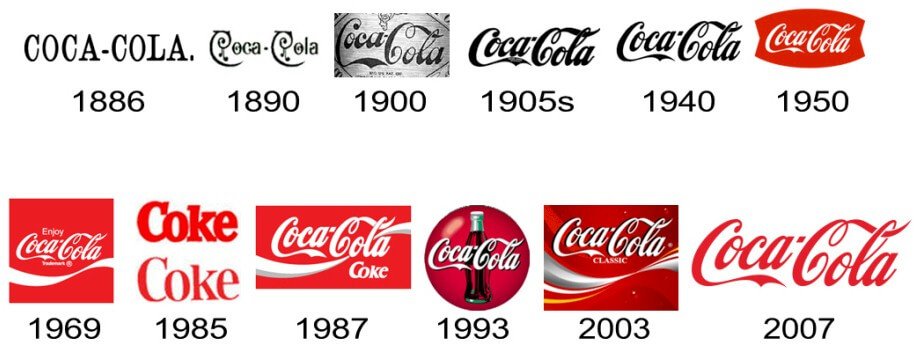Table of Contents
The term logo is an abbreviation for the original term “logotype,” which is formed from the Greek terms logos (word) and typos (typography) (imprint). The origins of logos may be traced back to the birthplace of civilization, ancient Greece, about 2000bc. To signal and “advertise” their work, potters would place a simple mark on their work in the shape of a popular symbol like a moon, star, circle, etc. The simple image served as both their signature and calling card. The practice spread and even crossed continents, since it was popular in India, China, Egypt, and other locations. Craftsmen’s work might be recognized by people all over the world from thousands of kilometers away with a single glimpse.

Symbols to Logos: How Brands Were Made
From humble beginnings as basic symbols, the star rose to prominence as a mark of quality. As early as the mid-nineteenth century, Procter & Gamble utilized a star to identify its candles. It is in our propensity as humans to seek patterns and familiarity, and the sight of a star on a candle was a signal of constancy and is said to be the origin of the phrase “branding,” since the star was actually branded onto the candlesticks.
Companies quickly realized the value of a visual brand that could be understood and recognized in any language, allowing them to reach a larger audience for their products and services. Coca-renowned Cola’s typography and usage of the color red may be recognized in any language.

Elements of Great Logo Design
Although there is no secret formula that guarantees a logo’s success, there are key characteristics that all excellent logos have.
When designing a logo for a product, brand, business, team, organization, club, corporation, book, or even a nation, the designer must first research the history and intended usage of the new logo. Often, trends inspire a designer to create a logo that appears “of the moment,” and while a current logo may look excellent for a short period of time, the trend will pass and the logo will look antiquated.
Each Designer Has a Style
Each designer has their own style, and each designer has their own process for designing graphics to go with that style. There is no correct or incorrect approach to begin developing an index
Some designers do color research to verify that the colors are appropriate for a certain project, whilst others begin with the fonts or typefaces when creating a new style. (More about color and typefaces in the chapters that follow.) A logo might begin as a concept in one’s brain or as a hurriedly scrawled sketch on a napkin, but one thing is certain: a designer will go through a lot of trial-and-error stages to arrive at a final design that the rest of the world will see. Thats why you must get your logo designed by a good logo design company who makes professional designer logos and have a lot of experience.
Don’t Be Scared to Make Changes
When you create your own logo or have one created for you, don’t be scared to make changes until it works. Making adjustments and storing each version is an excellent approach to visualize a logo’s color range. Who knows, your logo’s final design may be between the initial concept and the twentieth modification.
Communicate a Narrative
However, it is possible to become too critical and lose sight of the greater picture. A logo should be able to communicate the narrative of your product and be instantly recognized, but keep in mind that no design can be everything to everyone at the same time. Even if your final logo is adored by 99 percent of the population, there will always be someone, somewhere who dislikes it. You can’t please everyone all of the time. Therefore, always go for an inexpensive logo design that you can truly afford.
Adapt and Refresh: Pepsi vs Coca Cola
To see that some corporations regularly adapt and refresh their branding while others stick to a style that has worked for years, consider the “Cola Wars” – Coca-Cola vs. Pepsi. Here are two multinational corporations that effectively sell the same product, cola. Despite a few blunders (see the New Coke crisis of the 1980s), Coke has managed to keep its branding constant over the years and even across borders. Even if you saw a Coke can in Russia, you’d identify it as a Coke even if it was printed in Russian. Coca-signature Cola’s script white letters, vivid red backdrop, and “wave” are so embedded in our society that they will never alter.

Pepsi, across the other side, is always modifying their appearance. They preserve a few components that help their brand stand out, but they also modify some key items, such as typefaces. Pepsi’s logo was initially extremely similar to Coca-in Cola that both employed a script, handwritten typeface for their names. But, over time, the two colas tried to differentiate themselves more clearly from one another, because Coke was red and Pepsi was blue (with some red and white thrown in for good measure). Pepsi created its red, white, and blue wave circle, which has remained with the company to this day.
Yes, it’s changed, but it’s always been a red, white, and blue wave circle.
Pepsi’s font has changed multiple times over the years and will most likely continue to change in the future since Pepsi understands that their brand must remain “current” or “trendy” in order to compete with Coke. Pepsi debuted a new blue hue for its drinks in 2014. They have been a dark blue color for many years, but they are now incorporating a more royal blue into their design.
In summary: The essence of Coca Cola logo and Pepsi logo have remained the same even after two centuries. They are still taking the same design forward and revising it according to the market demand.
Mack Chris is a specialist in LOGO Design and WEB Design with more than 5 years of experience in promoting and marketing brands in the digital world. He loves to read and share his digital marketing experience with the rest of the community. In his spare time, he enjoys drawing, sketching, plays football, and goes swimming.




